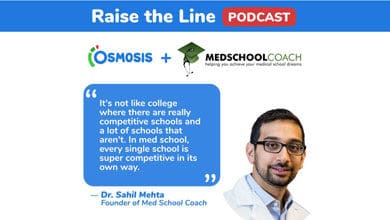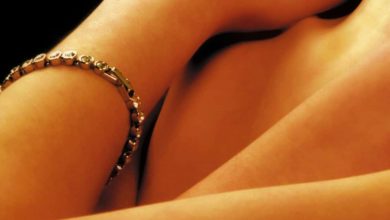You probably already know the admissions process to get into medical school is highly competitive. Every applicant has, at least:
- A strong GPA (on average, between 3.5 and 3.7)
- Competitive MCAT scores
- Research experience
- Clinical experience
- Volunteer work
- Glowing letters of recommendation
You don’t have much control over the whole application process. Even your GPA and MCAT score, to a certain extent, are not under your control. Nevertheless, the writing portions in your application are completely in your hands.
So how do you set yourself apart?
To stand out as a med school applicant, you need to tell your story in a way that answers the question: “Why do you want to join the medical field?”
The medical school personal statement is a key part of the primary application. Telling your story may seem simple, but you have to try and be unique, cohesive, and compelling to stand out from the ocean of similar-minded applicants.
Let’s take a look at the best ways to create an unforgettable med school application.
Our Physician Advisors can walk you through the medical school admissions and application process for your best shot at getting into the school of your choice.
1. Demonstrate Your Leadership Potential
As a physician, you will occupy a leadership role in both your professional life and society as a whole. Not only will you head up your patient care team, but you’ll also be the person your patients and their families will turn to for guidance. That’s a lot of responsibility. Your med school application should show that you can handle it.
Don’t panic — admissions officers know there aren’t enough graduating classes for every medical school applicant to be a class president. If you haven’t held an office, maybe you’ve captained a sports team or led a research project. Maybe you’ve organized a fundraiser or other event. Think of ways you’ve demonstrated leadership both within and outside of academia.
If you can discuss how your leadership role pushed you out of your comfort zone or helped you grow, talk about it. Show that you can both take responsibility as a leader and remain open to new ideas.
2. Clarify Your Specific Goals
To impress admissions committees, make it clear that you have a specific goal in mind for your career. The vague mantra of, “I want to help people,” just doesn’t make the cut. Thousands of other applicants want to help people — what do you want to do specifically and why does that make you an attractive med school applicant?
To write a compelling and memorable personal statement, you need a clear focus and the skills and experiences to support it. If you have the time, seek out this passion in the early stages of your pre-med career and build your skills and experiences from there.
By the time you apply to med school, you’ve had research opportunities, some patient exposure, and ample time to volunteer with underserved communities. All those extracurricular activities under your belt should help to inform your passion for medicine.
3. Emphasize What Makes You Unique
It may seem like a good idea to write about the toy stethoscope you got as a child, that you came from a family of doctors, or that you really want to help people. However, those answers are some of the most common topics and your assessor has read them many times before.
What will make my med school application stand out? Your application will stand out if you focus on a story no one else can tell. Your personal statement should be just that — personal.
To write a stand-out personal statement, follow these basic rules:
- Stick to your real-life experiences, not your future plans. It’s okay to discuss your goals, but the main focus should be your current self. Most pre-med students have similar goals for med school. They won’t set you apart. Instead, discuss a meaningful experience you’ve already had, and why it led you to seek medical education.
- Give a narrative, not a summary. There’s a difference between explaining a circumstance and telling a story. Tell a story in your personal statement.
- Don’t focus on metrics. How you rank in standardized tests is only a small part of the whole you. This is your place to give a broader self-portrait — especially if your grades aren’t very impressive. Besides, admissions committees have access to your MCAT score and GPA. Don’t waste precious characters on redundant information.
- Don’t let AI tell your story. While tools such as ChatGPT can be helpful for grammar and sentence structure, relying too heavily on it can result in a generic essay lacking personal touch and insights that admissions committees seek. You want your emotion and tone and personal experiences to come through loud and clear. (If you’re thinking of using AI, scroll down to our bonus tip to read our thoughts and advice.)
What makes you a unique applicant for medical school? What makes you unique can be anything from ultra-high scores, a highly diverse background, bilingual abilities, or limitations you’ve overcome, all the way to how to create art.
If you’re struggling to think of a unique story to tell, think through your academic career so far. Here are some questions to get you started:
- Are you a non-traditional applicant?
- Is your undergrad field of study atypical for a pre-med track? If so, how has it informed your passion for medicine?
- Have you taken a gap year to get more research experience or clinical exposure before starting med school?
- Are you switching careers after working as an emergency medical technician (EMT)?
- Have you volunteered abroad?
- If you haven’t volunteered abroad, how has volunteering at home impacted you?
- Do you have experiences before college that drove you to a career in medicine? Perhaps you had a particularly positive experience with a physician treating a family member or underwent a significant medical challenge.
Read Next: A Guide To Medical Schools That Don’t Require the MCAT
4. Present Yourself As a Team Player
Make sure that when you’re writing about your personal experiences, you take the time to emphasize that you can work within a team and how you’ve done it in the past.
No doctor works solo — you’ll be practicing teamwork throughout med school and your medical career. Use this opportunity to show admissions committees you can add value to their team.
Try to use “we” instead of “I” when discussing group projects or research experience. For example, if you and your friends organized a fundraiser to feed the homeless, saying “we organized a fundraiser” shows you are a team player.
Our Physician Advisors can help double your chances at getting into the school of your choice.
5. Develop an Online Brand
In 2024, one way to stand out in your Work & Activities section is to have an existing online brand. When you attend medical school, your existing audience will get to hear about it. That’s free publicity for the medical school, especially if your brand is one they’re proud of.
But what you create online doesn’t have to just be about medicine. Maybe you create content to share about the needs of underprivileged folks in your city. Perhaps you’re passionate about cooking and serving patients with diabetes, so you share diabetes-friendly recipes.
One common mistake is leaving out experiences that don’t directly pertain to medicine but still help shape a student’s character and interests. A well-balanced application may include experiences in intramural sports, spending a summer in Peru hiking, and even presenting those makeup tutorials on Instagram or TikTok. (We’re looking at you, future dermatologists.) Maybe you even have a personal website showcasing your experiences and writings.
Engagement with an online community that sees you as a leader is a great addition to your application, especially if you want to go into public health. Schools look for diversity in many ways, and the unique experiences in this section may lead to contributions you can provide in med school.
Note: Make sure your online brand is respectable — comb through and make sure there are no links back to your inappropriate videos from high school.
Read this comprehensive guide from MedSchoolCoach on building an online brand as a pre-med.
6. Optimize Your Personal Experiences For Your Application
There are 5 experiences that look good on a medical school application: shadowing, clinical work, community service, research, and hobbies.
- Shadowing: Ideally, shadow 3 different physicians in 3 different specialties to demonstrate you’ve taken time to explore what’s out there. While shadowing in person is best and crucial, virtual shadowing online may also provide an opportunity to learn about many medical specialties in a condensed time period.
- Clinical Work: We recommend serving as a scribe (such as ProScribe), EMT, or hospice volunteer. These roles offer more in-depth involvement with patients and responsibilities versus traditional hospital volunteering. However, let’s say the only available opportunities are ones like hospital volunteering — they’re still worth doing. Try to find ways to differentiate yourself by asking for more responsibilities or even spearheading a project if possible.
- Community Service: Altruism is important to medical schools. Demonstrate long-term involvement, whether it’s through volunteering at a soup kitchen, tutoring, or participating in a program like Habitat for Humanity. MedSchoolCoach partners with Global Medical Brigades for ethical international volunteering to offer students an opportunity to not just get volunteer experience, but learn about what medicine looks like throughout the world.
- Research: Have at least 2 years of experience. Ideally, you want to have at least a middle-author publication and do poster presentations.
- Hobbies: Don’t forget this! They are a great way to show your non-healthcare interests and differentiate yourself. For instance, if you knit mittens as gifts or create collages, include that in your Work & Activities section.
When optimizing your Work & Activities section, try to use the metrics with which medical schools rate these experiences:
- Commitment: Have at least 2 to 3 years of experience, whenever possible.
- Evolution/Growth: Build up your knowledge, skills, approaches to thinking, and responsibilities.
- Leadership: Demonstrate leadership by coordinating the efforts of multiple people to achieve a specific goal.
- Results: Applicants often forget about this. It’s not only about detailing what you’ve done, but also what you’ve achieved. For example, if you were the fundraising chair for a club: How much did you raise? How much more was this than the prior year? If you raised more from one year to the next, what did you do differently to raise this additional money?
7. Take Initiative in the Application Process
Apply early. We cannot overstate the importance of applying early — preferably, no later than the end of June in your application cycle year. AMCAS verification takes a few weeks. Applicants who submit early might see better acceptance rates, as many schools accept students on a rolling basis.
Read Next: Should You Apply Early Decision to Medical School?
Ask for application materials early. By the time a medical school admissions committee receives your application, make sure they also have your official transcripts. Letters of recommendation aren’t usually required until you submit secondary applications, but we recommend applicants include them with their primary application.
Know your schools’ secondary application requirements. After you’ve submitted your primary application, check this report from AAMC for each school’s secondary application fees and deadlines. Many schools automatically send secondaries, so it’s a good idea to at least outline some secondary essays ahead of time. Aim to submit those applications within 2 weeks of receipt.
8. Don’t Miss the Basics
A lot is riding on your AMCAS application (or AACOMAS or TMDSAS applications). Between personal statements, gathering letters, submitting transcripts, and completing your prerequisite coursework, you have a lot on your plate.
Here are some basic tips to keep in mind:
Choose your schools wisely. Deciding which schools to apply to is integral to your chance of acceptance. Try the Medical School Chance Predictor before you apply.
Stay organized. Keep an active list or calendar of due dates and refer to it often. You don’t want to get all your ducks in a row only to realize too late that you haven’t requested your transcripts yet.
Proofread everything. Twice. Don’t overlook the details. Med school admissions teams certainly won’t. Make sure your application displays these core competencies:
- The diligence and intellectual capacity to succeed in an intense medical school curriculum and board examinations
- An understanding of the physician’s role in healthcare and physician-patient relationship
- The ability to communicate effectively and compassionately
- Good moral character
- An understanding of hypothesis-driven research
- Ability to lead and innovate
9. Don’t Just Let AI Write For You
AI is a great resource for rewriting clunky sentences, giving you ideas, or helping catch potential issues in your writing. In fact, we love our AI-Powered Personal Statement Analyzer. But it’s not going to be great at explaining why YOU, the human being in question, are a standout applicant.
AI falls short on unique responses. As we’ve tried to emphasize, your personality plays a huge role in making your application pop. If multiple students use AI to write essays, for instance, admissions officers would potentially have to read through countless copies of similar personal statements, all lacking personality.
Don’t be tempted to use tools like ChatGPT to do the work for you.
And if you do use AI to help you with editing or tweaking, make sure to run the final product through an AI content detector to ensure your work doesn’t raise any red flags. While this is a relatively new area, it’s possible that medical schools may begin using AI content detection as part of their approval process.
Want the Best Chance at Getting Accepted to Medical School?
Fewer than half of medical school applicants matriculate into a program each year. With so many things to remember, why not get the help of professionals who have served on admissions committees?
Double your chances at acceptance with the help of Physician Advisors from MedSchoolCoach. Your first consultation is free!



